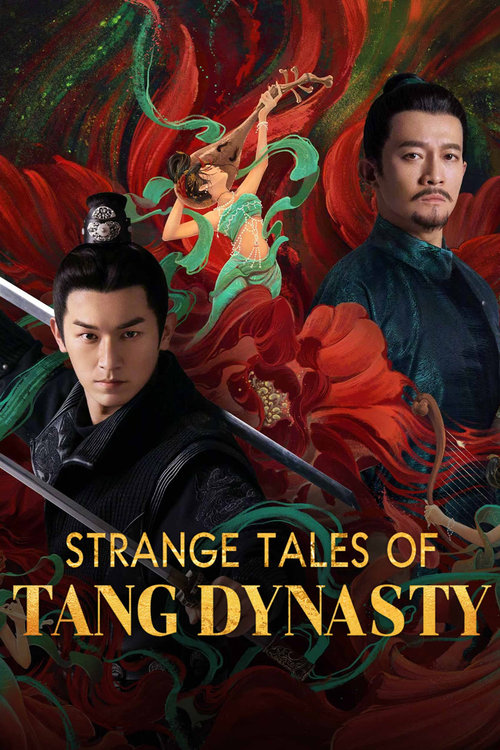
Ask Your Own Question
What is the plot?
In "The Politics of Marriage," the episode opens with a focus on the intricate web of alliances and power dynamics that shape the world of Westeros. The camera pans over the bustling streets of King's Landing, where the atmosphere is charged with tension as various factions maneuver for influence. The narrator introduces the concept of marriage as a strategic tool in the realm, setting the stage for the political machinations to come.
The first major scene features Cersei Lannister, who is seen in the Red Keep, contemplating her family's precarious position following the death of her father, Tywin Lannister. Cersei's internal struggle is palpable as she grapples with her desire for power and her protective instincts towards her children. She discusses potential marriage alliances with her brother Tyrion, who is skeptical of their effectiveness. Cersei's frustration with Tyrion's lack of ambition is evident, leading to a heated exchange that underscores their fraught relationship.
Next, the focus shifts to the Stark family, particularly Sansa Stark, who is still reeling from the trauma of her recent experiences. Sansa is approached by Petyr Baelish, who offers her a glimmer of hope and a potential escape from her dire circumstances. Baelish's charm and manipulation are on full display as he subtly suggests that a marriage to him could provide her with safety and power. Sansa's emotional turmoil is clear as she weighs her options, torn between her desire for freedom and her fear of further betrayal.
Meanwhile, in the North, Jon Snow is grappling with his own political dilemmas as he navigates the complexities of leadership at the Night's Watch. He is confronted by his fellow brothers, who are divided over the issue of accepting wildlings into their ranks. Jon passionately argues for compassion and unity, believing that their survival depends on collaboration rather than division. His internal conflict is evident as he struggles to balance his loyalty to the Night's Watch with his growing empathy for the wildlings.
The episode then transitions to a tense meeting between the Tyrells and the Lannisters, where the stakes of marriage alliances are laid bare. Margaery Tyrell, with her keen political acumen, engages in a strategic conversation with Cersei, both women vying for influence over King Tommen. The dialogue is laced with subtext, as each woman attempts to outmaneuver the other while maintaining a facade of civility. The tension escalates as they discuss the potential marriage between Margaery and Tommen, highlighting the power struggles inherent in their respective families.
As the episode progresses, the narrative shifts back to Sansa, who is increasingly drawn to Baelish's promises of a better life. She begins to see him as a potential ally, despite her lingering doubts. Baelish's manipulation deepens as he reveals his own ambitions, hinting at a larger plan that involves not just Sansa but the entire realm. Sansa's emotional state fluctuates between hope and fear, showcasing her vulnerability in a world where trust is a rare commodity.
In a pivotal scene, Jon Snow faces a critical decision regarding the wildlings. After a heated debate among the Night's Watch members, he ultimately decides to advocate for their acceptance, believing it is the only way to unite against the looming threat of the White Walkers. This decision marks a significant turning point for Jon, as he embraces a more progressive stance that could alienate him from his brothers.
The episode culminates in a dramatic confrontation between Cersei and Margaery, where the stakes of their political rivalry become increasingly personal. Cersei's jealousy and fear of losing power lead her to make a bold move, attempting to undermine Margaery's influence over Tommen. The tension reaches a boiling point as both women realize that their fates are intertwined, and the battle for control of the Iron Throne is far from over.
In the final moments, Sansa makes a decisive choice to align herself with Baelish, signaling her acceptance of the dangerous game of politics. The episode closes with a sense of foreboding, as the characters' decisions set in motion a series of events that will have far-reaching consequences for the realm. The intricate dance of marriage and power continues, leaving viewers on the edge of their seats, eager to see how these alliances will unfold.
What is the ending?
In the episode "The Politics of Marriage," the focus is on the intricate and often treacherous alliances formed through marriage in the world of Westeros. The episode concludes with various characters solidifying their positions through strategic unions, while others face the consequences of their choices. Key characters navigate the complexities of love, power, and betrayal, ultimately leading to a series of marriages that will shape the future of the realm.
As the episode unfolds, we begin with a scene in the Red Keep, where Cersei Lannister is seen discussing the importance of marriage as a political tool. Her cold demeanor reveals her understanding of the stakes involved, as she contemplates her own marriage to King Robert Baratheon. Cersei's internal conflict is palpable; she is torn between her loyalty to her family and her desire for power. The camera lingers on her face, capturing the flicker of ambition in her eyes.
Next, we shift to the Stark family in Winterfell. Eddard Stark, known for his honor, grapples with the implications of marrying his daughters off to secure alliances. He is seen in a somber discussion with Catelyn Stark, who expresses her concerns about the dangers of such unions. The tension between them is thick, as Catelyn fears for their daughters' futures. Eddard's stoic exterior hides a deep-seated worry about the political landscape, and the weight of his responsibilities is evident in his furrowed brow.
The narrative then moves to King's Landing, where Sansa Stark is introduced to the idea of marrying Joffrey Baratheon. Sansa's youthful innocence clashes with the harsh realities of court life. Her dreams of romance are shattered as she learns about the true nature of her betrothal. The scene captures her naivety, as she gazes longingly at Joffrey, unaware of the darkness that lies beneath his charming facade. The camera captures her shifting emotions, from excitement to dread, as she realizes the implications of her engagement.
Meanwhile, in the North, Robb Stark is faced with the prospect of marrying for political gain. He is torn between his feelings for a woman he loves and the duty to his family. The internal struggle is highlighted through close-ups of his conflicted expression, as he weighs the importance of loyalty against personal desire. The scene is charged with emotion, showcasing the heavy burden of leadership that weighs on him.
As the episode progresses, we see the Lannisters maneuvering to secure their power through strategic marriages. Tyrion Lannister, often underestimated, plays a crucial role in these discussions. His sharp wit and intelligence shine through as he navigates the treacherous waters of court politics. The tension in the room is palpable as he advocates for alliances that will strengthen their position, revealing his deeper understanding of the game being played.
The episode culminates in a series of marriage announcements that reverberate throughout the realm. Cersei's marriage to Robert is solidified, despite her personal feelings. Sansa's engagement to Joffrey is publicly declared, sealing her fate in a world where love is often sacrificed for power. The final scenes are filled with a sense of foreboding, as the camera pans over the characters' faces, each reflecting their own hopes and fears.
In the closing moments, we see Eddard Stark standing alone, contemplating the choices made by his family. His expression is one of resignation, as he realizes the sacrifices that must be made for the sake of honor and duty. The episode ends on a somber note, emphasizing the harsh realities of political marriages in Westeros, where love is often overshadowed by ambition and betrayal. Each character is left to grapple with the consequences of their decisions, setting the stage for the conflicts that will arise in the future.
Is there a post-credit scene?
In the episode "The Politics of Marriage" from the Game of Thrones specials, there is no post-credit scene. The episode focuses on the intricate dynamics and strategies behind the marriages within the noble houses of Westeros, exploring how these unions are often more about political alliances than love. The discussions and insights provided by various characters highlight the emotional and strategic weight of these marriages, but the episode concludes without any additional scenes or teasers after the credits.
What role does marriage play in the political alliances of the major houses in Westeros?
Marriage is a crucial tool for forming alliances and securing power among the major houses in Westeros. The episode explores various marriages, such as the union between House Stark and House Tully, and how these alliances impact the political landscape.
How does Cersei Lannister's perspective on marriage differ from that of Sansa Stark?
Cersei views marriage as a means to gain power and control, often manipulating it to her advantage, while Sansa initially sees it as a romantic ideal, reflecting her naivety and desire for love. Their contrasting views highlight the harsh realities of political marriages.
What are the implications of the marriage between Daenerys Targaryen and Khal Drogo?
The marriage between Daenerys and Drogo serves as a pivotal moment for Daenerys's character development. Initially a means of survival and alliance, it transforms into a relationship that empowers Daenerys, allowing her to embrace her identity and destiny.
How does the episode depict the consequences of the marriage between Robb Stark and Jeyne Westerling?
Robb's marriage to Jeyne Westerling, which he enters into out of love rather than political strategy, leads to significant consequences for the Stark family, including the loss of support from the Freys, ultimately impacting the war in the North.
What strategies do the Lannisters employ to manipulate marriages to their advantage?
The Lannisters, particularly Cersei and Tywin, use strategic marriages to consolidate power, such as planning the betrothal of Sansa Stark to Joffrey Baratheon, showcasing their ruthless approach to securing their family's dominance in the realm.
Is this family friendly?
"The Politics of Marriage," a special episode from the "Game of Thrones" series, delves into the intricate and often dark themes surrounding marriage and alliances in the world of Westeros. While the episode is rich in political intrigue and character development, it does contain several elements that may be objectionable or upsetting for children or sensitive viewers.
-
Themes of Manipulation and Betrayal: The episode explores the often ruthless nature of political marriages, showcasing how characters manipulate one another for power, which may be unsettling for younger audiences.
-
Discussion of Violence and War: There are references to the consequences of political decisions, including war and violence, which can be distressing.
-
Emotional Turmoil: Characters experience significant emotional struggles, including heartbreak and betrayal, which may resonate deeply and evoke strong feelings.
-
Mature Relationships: The episode touches on the complexities of romantic relationships, including the sacrifices made for political gain, which may not be suitable for younger viewers.
-
Dark Humor and Cynicism: The tone can be quite cynical, with humor that may not be appropriate for all audiences, particularly children.
Overall, while the episode provides valuable insights into the narrative of "Game of Thrones," its mature themes and emotional depth may not be suitable for all viewers, especially younger children or those sensitive to such content.
























